
It’s a familiar failure-to-launch narrative: Millennials are more likely than earlier generations to live at home, clinging to comforts provided by their parents. But before dismissing a whole generation as lacking in independence, consider the economic factors contributing to this trend. Between staggering student loans and skyrocketing housing costs, young adults today face plenty of barriers to affording their own living arrangements. Moreover, the vast majority of millennials who live at home are working or going to school, rather than riding their parents’ couches. Is living at home a lazy delay in accepting adulthood, or a new normal born of financial necessity? We decided to gather both sides of the story, surveying 1,001 people at various stages of residential independence. From young adults who still happily live at home to parents who begrudgingly continue to house their children, our participants shared the causes and costs of their living arrangements. Our findings uncover whether millennials are fundamentally different than earlier generations in accepting independence and examine the impact of their circumstances on their parents. To discover the emotional and economic realities of young adults and their parents living under one roof, keep reading.
Money to move back
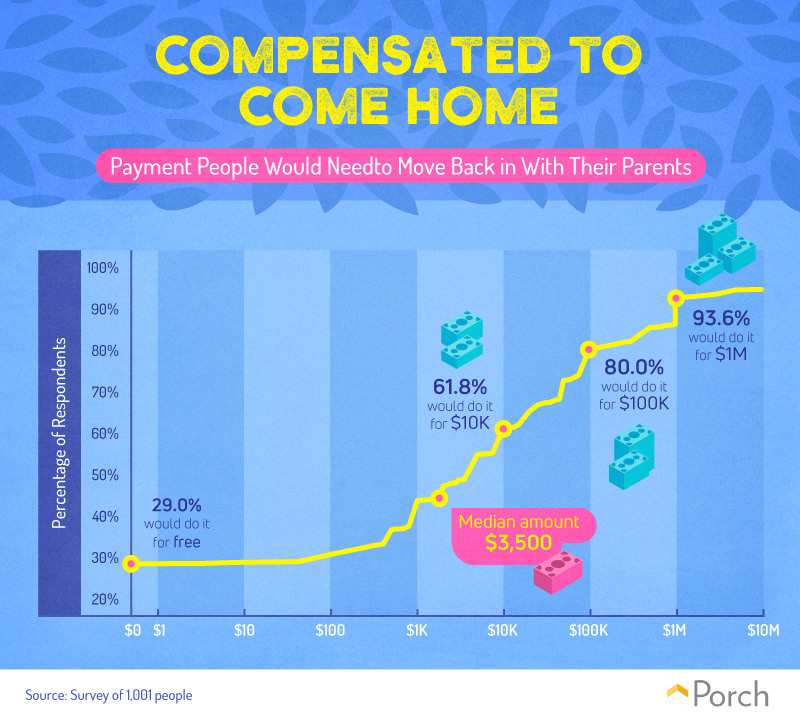 We began with a basic measure of the appeal of moving back in with one’s parents: How much money would it take to convince our participants to move back home? For nearly 3 in 10 people surveyed, the answer was nothing at all—they’d head back home for free. Most people put the price of their residential independence at a few thousand dollars, and nearly 62 percent said they’d come back home for $10,000. Of course, there were some ardent outliers: Roughly 6 percent of individuals said they wouldn’t move back home even for $1 million. Of course, trade-offs of this kind aren’t merely abstractions: In markets where rents are high and continually increase, moving back home could save individuals thousands of dollars in just a few months. In Manhattan, where the average rent is $3,667, for example, even a few rent-free months with one’s parents could be too enticing to turn down. In fact, many millennials have opted to stay at home until they can enter the housing market as buyers. Rather than paying sizeable rents each month, these young homeowners steadily save for a down payment instead. Of course, these plans are entirely dependent on the hospitality of their parents, the next subject we considered.
We began with a basic measure of the appeal of moving back in with one’s parents: How much money would it take to convince our participants to move back home? For nearly 3 in 10 people surveyed, the answer was nothing at all—they’d head back home for free. Most people put the price of their residential independence at a few thousand dollars, and nearly 62 percent said they’d come back home for $10,000. Of course, there were some ardent outliers: Roughly 6 percent of individuals said they wouldn’t move back home even for $1 million. Of course, trade-offs of this kind aren’t merely abstractions: In markets where rents are high and continually increase, moving back home could save individuals thousands of dollars in just a few months. In Manhattan, where the average rent is $3,667, for example, even a few rent-free months with one’s parents could be too enticing to turn down. In fact, many millennials have opted to stay at home until they can enter the housing market as buyers. Rather than paying sizeable rents each month, these young homeowners steadily save for a down payment instead. Of course, these plans are entirely dependent on the hospitality of their parents, the next subject we considered.
Parental perspectives
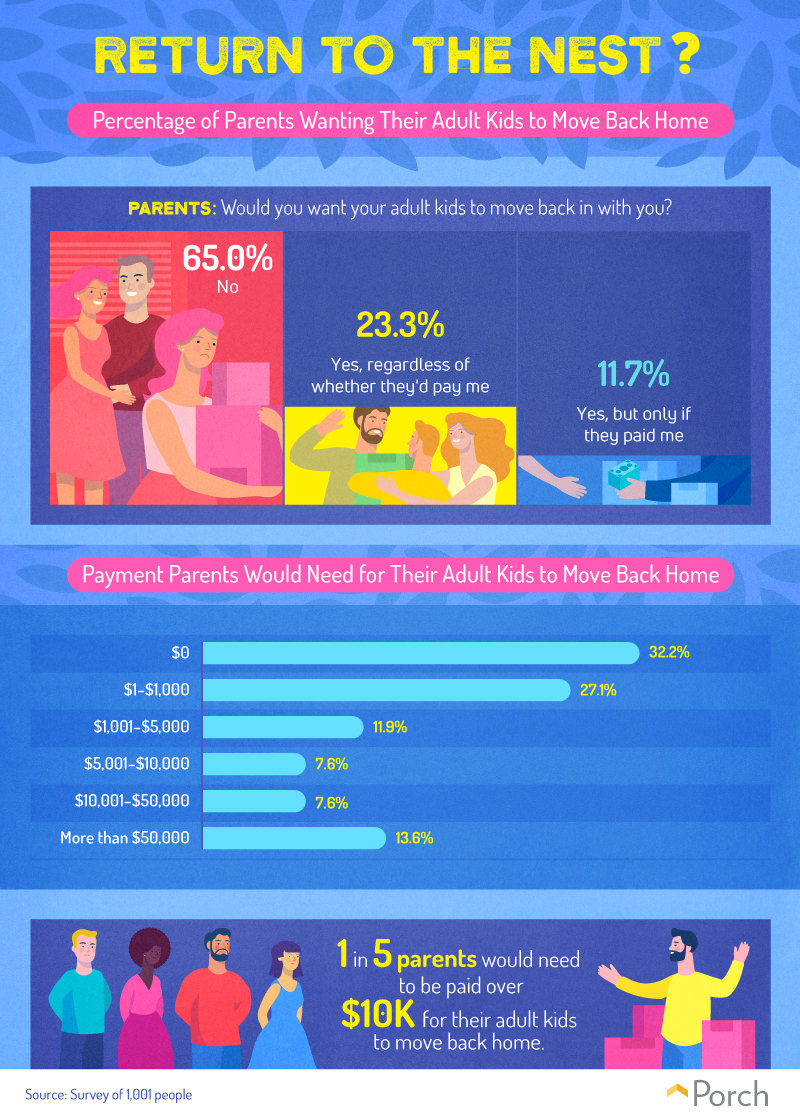 Sorry, adult children: However much you stand to save, it’s unlikely your parents will welcome you back home. Nearly two-thirds of parents said they wouldn’t want their grown kids to move back in with them. Twenty-three percent voiced the opposite opinion, declaring they’d welcome their children back with open arms. It’s worth noting that patterns of young adults cohabitating with their parents vary substantially across the country: In expensive markets such as Miami and New York, over 40 percent of recent college grads move back home at least temporarily. Perhaps parents in these areas are willing to host their children knowing it’s the only way to keep them living close by. About 12 percent of parents preferred a compromise of sorts: They’d want their adult children to come home only if they agreed to pay rent. It seems few parents would charge anything close to market rates, however: Nearly 60 percent said they’d accept $1,000 or less to let their kids move home. With average rents exceeding $1,400 a month nationally, that cost seems like a pretty sweet deal. Then again, some folks demanded a pretty penny to let their children come home: Almost 14 percent said they’d need more than $50,000 to let their adult offspring live with them again.
Sorry, adult children: However much you stand to save, it’s unlikely your parents will welcome you back home. Nearly two-thirds of parents said they wouldn’t want their grown kids to move back in with them. Twenty-three percent voiced the opposite opinion, declaring they’d welcome their children back with open arms. It’s worth noting that patterns of young adults cohabitating with their parents vary substantially across the country: In expensive markets such as Miami and New York, over 40 percent of recent college grads move back home at least temporarily. Perhaps parents in these areas are willing to host their children knowing it’s the only way to keep them living close by. About 12 percent of parents preferred a compromise of sorts: They’d want their adult children to come home only if they agreed to pay rent. It seems few parents would charge anything close to market rates, however: Nearly 60 percent said they’d accept $1,000 or less to let their kids move home. With average rents exceeding $1,400 a month nationally, that cost seems like a pretty sweet deal. Then again, some folks demanded a pretty penny to let their children come home: Almost 14 percent said they’d need more than $50,000 to let their adult offspring live with them again.
Contributing or adding costs?
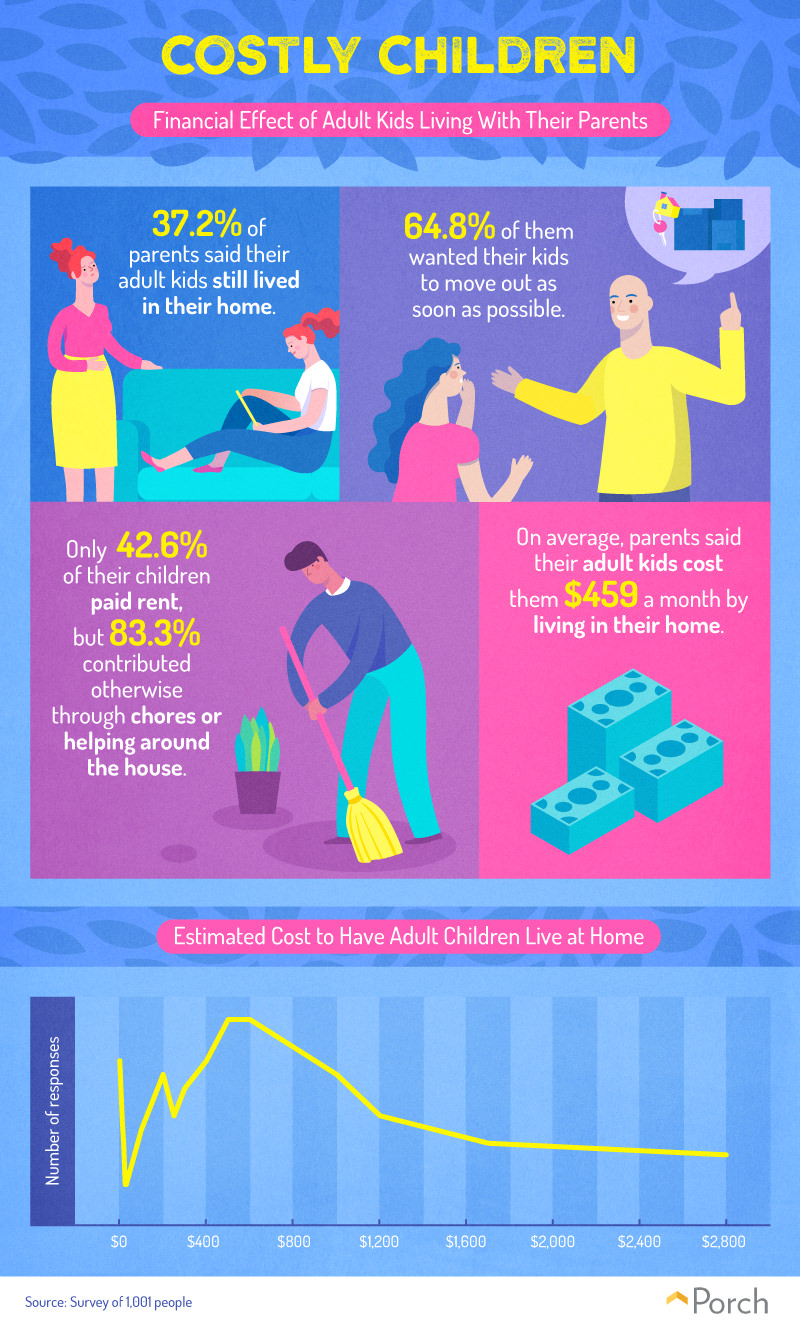 Among the parents surveyed, 37 percent said their children lived with them currently—and the majority of this group hoped that would change soon. Nearly 65 percent expressed the wish for their children to leave home as soon as possible—whether these sentiments stem from an earnest desire to see their kids gain independence or the frustrations of cohabitation is an open question, however. While experts maintain that clear communication about ground rules can help prevent conflict, tension naturally arises between parents and their adult children. From differing schedules to romantic partners sleeping over, a range of concerns might prompt loving parents to yearn for the day their child leaves. Still, the greatest burden of hosting adult children may be financial: The average estimated cost of housing an adult child at home was $459 a month. One reason for that cost could be that most “boomerang kids” aren’t paying to reside with their parents. Just 43 percent of parents with adult children at home said their kids paid rent, although 83 percent said their children pitched in other ways, like performing chores. While some experts claim not charging rent amounts to enabling arrested development, many families start with smaller steps instead, such as asking their children to pay for their own phone bills.
Among the parents surveyed, 37 percent said their children lived with them currently—and the majority of this group hoped that would change soon. Nearly 65 percent expressed the wish for their children to leave home as soon as possible—whether these sentiments stem from an earnest desire to see their kids gain independence or the frustrations of cohabitation is an open question, however. While experts maintain that clear communication about ground rules can help prevent conflict, tension naturally arises between parents and their adult children. From differing schedules to romantic partners sleeping over, a range of concerns might prompt loving parents to yearn for the day their child leaves. Still, the greatest burden of hosting adult children may be financial: The average estimated cost of housing an adult child at home was $459 a month. One reason for that cost could be that most “boomerang kids” aren’t paying to reside with their parents. Just 43 percent of parents with adult children at home said their kids paid rent, although 83 percent said their children pitched in other ways, like performing chores. While some experts claim not charging rent amounts to enabling arrested development, many families start with smaller steps instead, such as asking their children to pay for their own phone bills.
Achieving independence
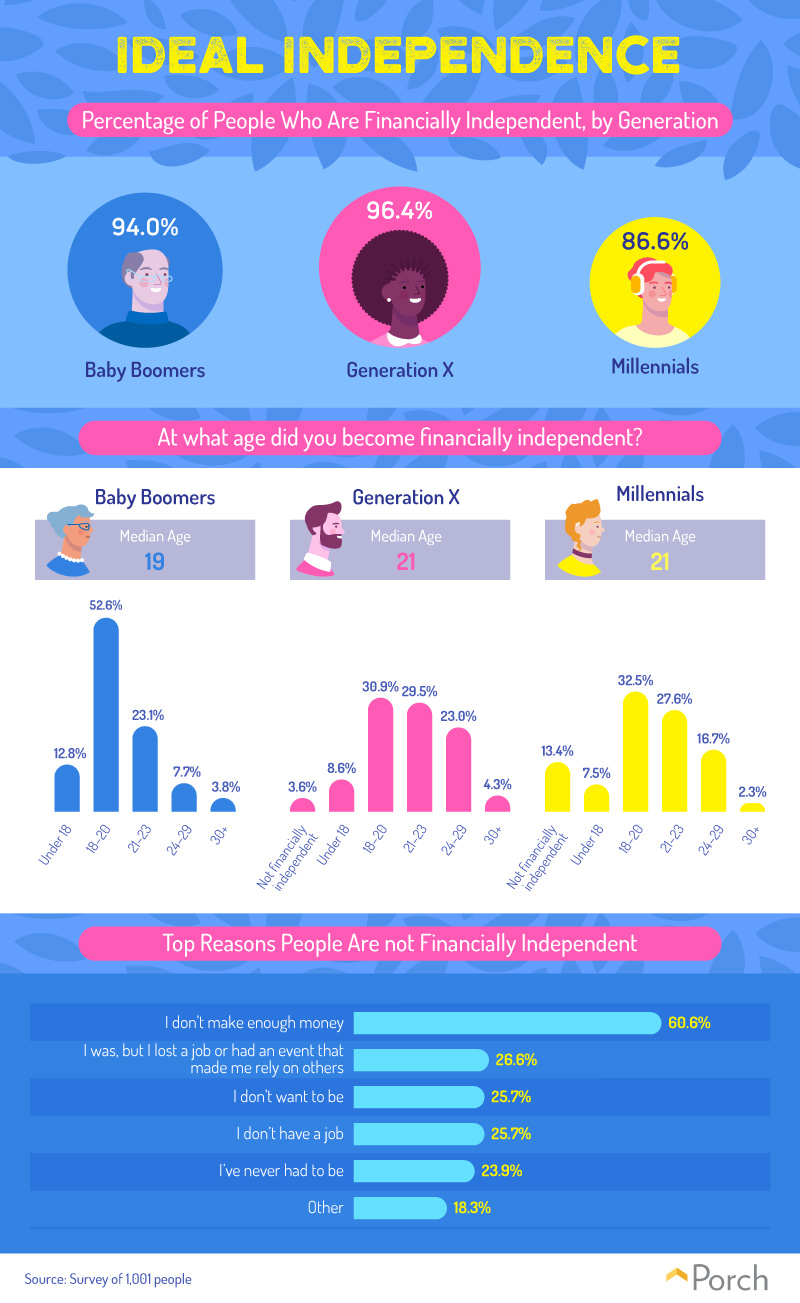 Despite the evidence that many young adults continue to live at home, the majority of each generation identified as financially independent. Interestingly, Gen Xers were slightly more likely to claim financial self-sufficiency than baby boomers, perhaps because some older individuals encounter health problems that prevent them from supporting themselves. On average, however, baby boomers reached financial independence at age 19, two years ahead of Gen Xers and millennials. This trend likely reflects dramatic shifts in college attendance: Millennials and Gen Xers are more likely than their elders to pursue postsecondary education, likely delaying their emergence as self-sufficient workers. Among those who did not identify as financially independent, almost 61 percent explained they simply didn’t earn enough to support themselves. Those who can’t entirely support themselves often work full time. According to one recent study, nearly a quarter of millennials with full-time jobs depend on their parents to cover some bills. Still, many cited problems with employment as a cause of their reliance upon others. Over a quarter of respondents said they fell from financial independence after losing a job or experiencing a professional setback of some kind. A similar portion of financially dependent people noted they weren’t working currently, despite record lows in unemployment.
Despite the evidence that many young adults continue to live at home, the majority of each generation identified as financially independent. Interestingly, Gen Xers were slightly more likely to claim financial self-sufficiency than baby boomers, perhaps because some older individuals encounter health problems that prevent them from supporting themselves. On average, however, baby boomers reached financial independence at age 19, two years ahead of Gen Xers and millennials. This trend likely reflects dramatic shifts in college attendance: Millennials and Gen Xers are more likely than their elders to pursue postsecondary education, likely delaying their emergence as self-sufficient workers. Among those who did not identify as financially independent, almost 61 percent explained they simply didn’t earn enough to support themselves. Those who can’t entirely support themselves often work full time. According to one recent study, nearly a quarter of millennials with full-time jobs depend on their parents to cover some bills. Still, many cited problems with employment as a cause of their reliance upon others. Over a quarter of respondents said they fell from financial independence after losing a job or experiencing a professional setback of some kind. A similar portion of financially dependent people noted they weren’t working currently, despite record lows in unemployment.
Independence expectations
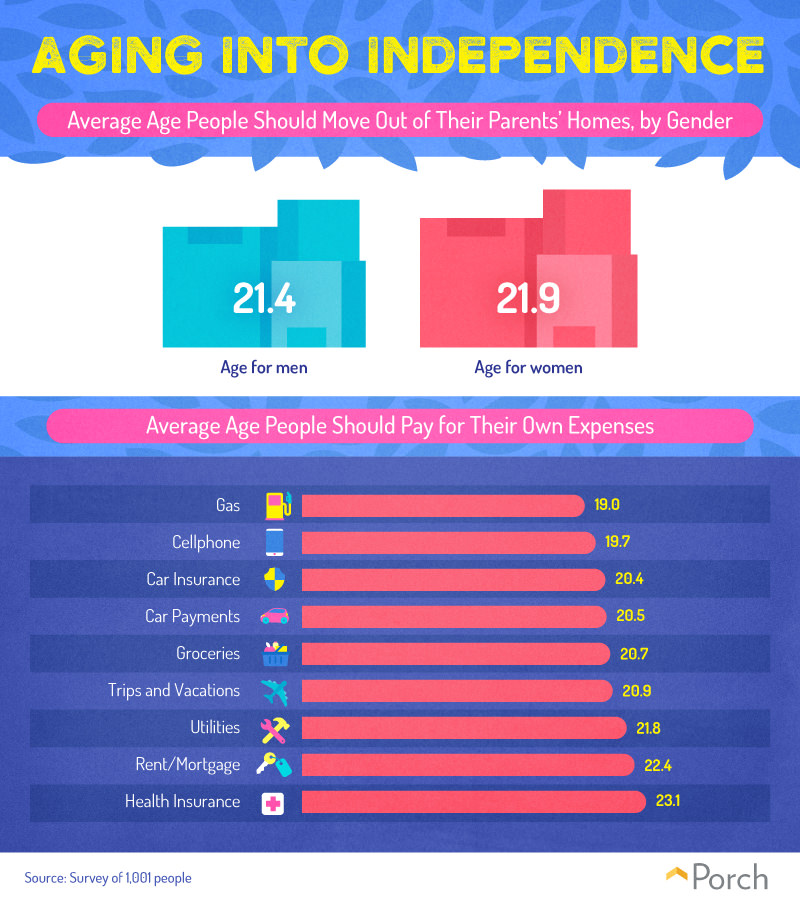 Although each family’s circumstances are distinct, when should individuals leap from parental dependence? Men and women expressed relatively similar perspectives overall; on average, their responses were 21.4 and 21.9 years of age respectively. These numbers correspond roughly to the age at which many people graduate from college, suggesting our culture’s expectations of financial independence are closely associated with one’s status as a student. Many college students don’t enjoy freedom from financial pressures, however. Over a third of college students qualify as “food insecure,” and many struggle to afford consistent housing. Respondents typically felt young adults should foot the bill for some costs before moving on to others. Expenses related to vehicles, for example, were typically viewed as costs that young people should assume around age 20. Conversely, our respondents typically felt young people could wait a couple more years before assuming responsibility for utilities and rent expenses. Lastly, they deemed 23 the appropriate age to start paying for health insurance—although most adult children are covered by their parents’ policies until age 26.
Although each family’s circumstances are distinct, when should individuals leap from parental dependence? Men and women expressed relatively similar perspectives overall; on average, their responses were 21.4 and 21.9 years of age respectively. These numbers correspond roughly to the age at which many people graduate from college, suggesting our culture’s expectations of financial independence are closely associated with one’s status as a student. Many college students don’t enjoy freedom from financial pressures, however. Over a third of college students qualify as “food insecure,” and many struggle to afford consistent housing. Respondents typically felt young adults should foot the bill for some costs before moving on to others. Expenses related to vehicles, for example, were typically viewed as costs that young people should assume around age 20. Conversely, our respondents typically felt young people could wait a couple more years before assuming responsibility for utilities and rent expenses. Lastly, they deemed 23 the appropriate age to start paying for health insurance—although most adult children are covered by their parents’ policies until age 26.
Renewing your nest—with or without children
Our data suggest a striking number of millennials remain dependent on their parents for basic expenses, including a place to live. Yet, the prevalence of these arrangements between parents and adult children suggests broader economic factors at work, rather than an entire generation unwilling to embrace autonomy. Indeed, casting judgment upon young adults who live at home could be counterproductive. When parents acknowledge the challenges they face, they can begin to support meaningful solutions. After all, parents and their adult children will be more effective as teammates than resentful roommates. Whether you live with adult children, or they have departed for homes of their own, your house may need upgrades to keep pace with your evolving needs. Or, maybe you’re a first-time homeowner eager to improve your new fixer-upper. Whatever the case may be, Porch lets you locate top pros in your area for any home improvement or security project. We’ll help you get one step closer to the dream home you deserve—no matter who still lives in it.
Methodology
To compile the data shown above, we surveyed 1,001 people about their attitudes toward family members, moving in, and living situations. 26.6 percent of our respondent group consisted of parents with children over 18, and 73.4 percent consisted of parents without children over 18. While we certainly had some outlandish answers for some cost estimates, we included only the top 95 percent of answers to remove outliers to our averages. The data are based on self-reported information, which has inherent biases, although every attempt was made to represent the data as accurately as possible.
Sources
- http://www.pewresearch.org/fact-tank/2017/05/05/its-becoming-more-common-for-young-adults-to-live-at-home-and-for-longer-stretches/
- https://www.cnbc.com/2018/05/10/nearly-25-percent-of-millennials-live-with-their-mom-.html
- https://www.thecut.com/2017/04/so-many-millennials-are-living-at-home-but-arent-burnouts.html
- https://www.businessinsider.com/manhattan-rent-by-neighborhood-ranked-from-lowest-to-highest-2018-5
- https://www.usatoday.com/story/money/2017/08/07/millennials-move-back-parents-save-house/512027001/
- https://www.marketwatch.com/story/more-recent-graduates-are-living-at-home-than-ever-before-2018-05-08
- https://www.cbsnews.com/news/u-s-urban-rents-hit-all-time-high-at-average-1405-report/
- https://www.realsimple.com/work-life/family/kids-parenting/adult-children-living-at-home
- https://www.usatoday.com/story/news/nation/2017/08/13/when-millennials-move-back-in-new-rules-apply/559066001/
- http://www.pewresearch.org/fact-tank/2017/05/16/todays-young-workers-are-more-likely-than-ever-to-have-a-bachelors-degree/
- https://www.cnbc.com/2018/03/05/parents-pay-some-bills-for-quarter-of-millennials-working-full-time.html
- https://money.cnn.com/2018/06/01/news/economy/may-jobs-report/index.html
- https://www.cnbc.com/2018/04/06/new-study-finds-that-36-percent-of-college-students-dont-have-enough-to-eat.html
- https://www.hhs.gov/healthcare/about-the-aca/young-adult-coverage/index.html
- https://www.aarp.org/money/budgeting-saving/info-2018/millennials-rely-on-families.html
- https://www.bls.gov/opub/ted/2017/prices-for-new-cars-up-5-percent-insurance-50-percent-over-last-10-years.htm
- https://www.foxbusiness.com/features/the-new-sticker-shock-plunging-cellphone-bills-2
Fair Use Statement
Just as with young adults, we hope this content will eventually leave home as well. If you’d like to help spread our findings elsewhere online, you’re welcome to use our graphics and data for noncommercial reuse. When you do, just credit us fairly by including a link back to this page.
